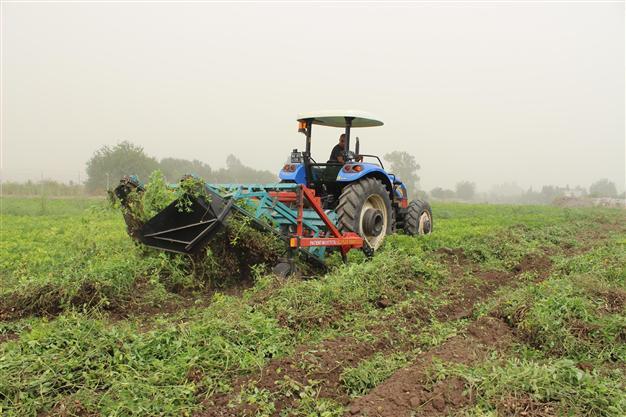Turkey’s plan to help farmers adapt to climate change? Ask a tablet
KAZAN - Reuters

DHA Photo
After years of fighting climate change - and usually losing - Turkey’s farmers are turning to modern technology for a deceptively simple solution. Under a government project that aims to promote flexible, sustainable farming, specially developed monitoring and information satellite systems now provide farmers with the data they need to continuously adapt to unpredictable weather.Launched in 2010, but still in the pilot stage, the project gives 3,000 tablet-owning farmers access to real-time agricultural data through a free intranet provided by the government.
At their fingertips, farmers have information on factors ranging from soil quality to atmospheric temperature, and from wind speed to warning signs of oncoming natural disasters. They share the information with their local community, so everyone can decide what crop is best to plant, when to plant it, and how to get the highest yield.
Wealth of information
Kazan is part of the central Anatolia region, which has an average yearly precipitation of only 300 millimeters (12 inches). Over much of Turkey, the scenario is no better.
“The 52 million hectares of arid and semi-arid agriculture land, which make up 65 percent of the total farmland in Turkey, are worst hit by climate change,” said Mahmut Temiz, an official at Turkey’s Ministry of Forestry and Water Affairs. “Annual rainfall now swings wildly between 250 to 2,250 millimeters.”
To take the guesswork out of farming in a region with such unreliable rainfall, the project put 1,200 ground stations around Turkey, most of them in the Anatolia region.
Costing $30,000 each to set up, the ground stations are equipped with as many as 40,000 different sensors, of which only 15,000 are in use now, giving the systems room to grow.
The sensors pick up and transmit data that includes wind speed and direction; the amount of solar radiation available to run farmers’ solar energy installations; temperature and moisture levels in the atmosphere and soil; rainfall measurements and predictions; and irrigation and fertilizer requirements at each stage of plant growth.
Every 10-to-30 minutes, the data is sent to a centralized information-processing and analysis station in Ankara run by Turkey’s Ministry for Food, Agriculture and Livestock.
Some of it is automatically fed back in a loop that farmers can access at the touch of a button. But if a farmer has a more in-depth query - such as how to get rid of a persistent crop pest - people sitting in the centralized office collate and analyze the data to send back an answer.
The project also employs 3,000 field advisers to assist the three million Turkish farmers who could benefit from the scheme’s information but can’t afford or can’t operate a tablet computer.
“It is a comprehensive ... monitoring network to manage drought and other agro-disasters,” said Gürsel Küsek, a senior official at the ministry’s Agricultural Reform department. “Turkey can mitigate climate change impacts by ‘precision farming’ through real-time information systems.”
Planting melon rather than melon
A farmer, who has been using the system since 2012, shows how he uses his iPad to find information on soil quality or send out pictures of an unfamiliar fungus attacking his plants.
He credits the project with saving the livelihoods of many in his community.
Last sowing season, he said, the system used sensor data for estimated water consumption and evapotranspiration (the sum of evaporation from the soil and transpiration from plants) to advise farmers in Kazan to plant melons instead of their traditional crop of white beans, which use twice as much water.
He also got the information on the specific seed variety to use given the climatic conditions, how much supplementary irrigation he would need, when to apply fertilizer, and specific disease risks.
After the September harvest, he made his highest ever turnover of 60,000 Turkish lira ($20,700) from the sale of his melons.
“Turkey is investing in a big way in advanced technology in the farm sector,” Metin Türker, an official in the General Directorate of Agrarian Reform, said.
“Even in the face of increasing drought, floods and soil erosion, we have to ensure food for our people.”
















